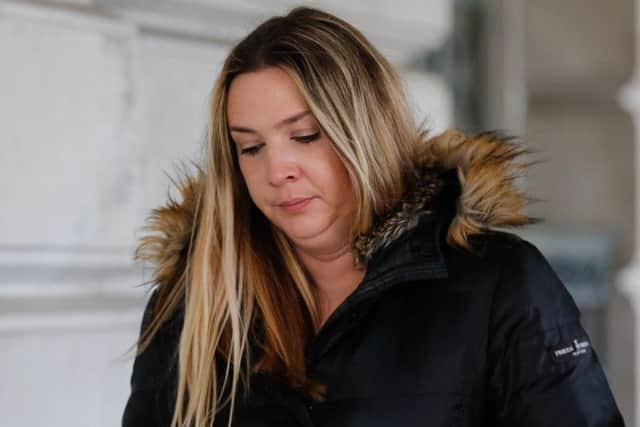'Lessons learned' over death of Mansfield teenager Amber Peat


Amber, aged 13, hanged herself after fleeing her home following a family argument.Her inquest found health, education and social care agencies missed 11 chances to help her before she died.The review was set up to examine what could be learned from the tragic events to improve child protection – and bosses have pledged safeguarding systems are now as “robust as they can be”.
IN OTHER NEWS:


Amber left her family home on Bosworth Street, Mansfield, on May, 30, 2015, at 5pm, after a dispute about chores with her mother Kelly Peat.The Queen Elizabeth’s Academy pupil was found hanged three days later in a wooded area off Westfield Lane, less than a mile away. At her inquest last month, Laurinda Bower, assistant Nottinghamshire coroner, said she could not be sure if Amber intended to kill herself.The coroner found Amber had been telling the truth when she said her stepfather Danny Peat had punished and humiliated her in attempts to instil discipline.The inquest heard Mrs Peat had not been particularly emotional when her daughter had gone missing.But Miss Bower also said social services missed “at least 11 opportunities” to intervene in Amber’s life.The review was commissioned by the Nottinghamshire Safeguarding Children Board soon after Amber’s death to examine what could be learnt that would lead to improvements in the way services worked with children and families. Amber had lived in Derbyshire until less than a year before her death, so the review therefore involved agencies from both areas.The review identified some areas where improvements should be made in the way agencies worked to safeguard children. In the report, Dr Cath Connor, author, said action to address these was started as soon as they were identified and progress was monitored by the board.The review established that while there were concerns for the emotional wellbeing of Amber – known as child KN15 in the report – it could not have been predicted that she would take her own life.The report said: “While there were concerns for the emotional wellbeing of KN15, given the information known to professionals at the time it was not possible to predict she would die in the circumstances which resulted in this review.“Records indicate KN15 ran away from home and presented with increasingly challenging and disruptive behaviour at school. Frequent moves of home, school, and GP made it difficult for professionals and agencies to develop a coherent picture of KN15 and the family. “Positive communication between agencies in Derbyshire and Nottinghamshire has been highlighted, however, this could have been more effective had there been a formal process for transfer of early-help interventions from one area to another.”“Prioritisation of the views of adults within the family and the focus by agencies on changing the behaviour of KN15 may have been identified and challenged if a multi-agency meeting involving all family members had been held.“It is not possible, however, to judge whether KN15 felt heard and understood, as support and intervention was focussed on the changes that she needed to make, without consistently looking at the wider family and exploring what may have been influencing her behaviour.”Speaking after the inquest on behalf of Amber’s mum Kelly, Amy Robinson, of East Midlands-based law firm Nelsons, said: “The inquest has not been an easy process. “Shortly before the coroner was due to provide her conclusion, the author of the serious case review, Dr Connor, requested to change her evidence when she told the court that ‘on the balance of probability’, it was likely Amber would not have taken her own life had the 11 missed opportunities not taken place. “Kelly feels that it was highly unprofessional to change such crucial evidence at the last moment.“In the space of one week, Dr Connor gave the coroner four different responses to the same question. “Further, as Amber died in 2015, the professionals have had long enough to form their conclusions and uncertainty is simply not good enough. “This issue has therefore given Kelly cause to be concerned about the validity of the serious case review into Amber’s death.“Kelly wonders whether things could have been different had Amber and her family received more support and advice for Amber’s behaviour. “She proactively sought help on numerous occasions with Amber, and tried to work with the agencies as much as possible. “Kelly was always willing to engage with any support offered, but no one got to the bottom of why Amber behaved the way that she did. While nothing will bring Amber back, Kelly is keen to ensure that the authorities learn from their mistakes, make the changes needed, and support families more in the future.”Chris Few, Nottinghamshire Safeguarding Children Board independent chairman, said: “We owe it to Amber to learn from what happened and Nottinghamshire Safeguarding Children Board commissioned an independent serious case review to examine what would lead to improvements in the way that agencies work to keep children safe.“Action was commenced to address learning from the review as soon as it was identified and extensive work has been undertaken to ensure that safeguarding systems are as robust as they can be.”
Advertisement
Hide AdAdvertisement
Hide AdJane Parfrement, Derbyshire County Council strategic director of children’s services, said: “Opportunities to improve practice have been identified and acted upon. We did not wait to hear the findings of the review before introducing these changes.“We have completed the work noted in the review’s recommendations and the coroner recognised that over the past four years robust processes have been put in place, including our ‘starting point’ single point of contact for child safeguarding concerns.”
Steve Edwards, Nottinghamshire County Council service director for youth, families and social work, said: “The council accepts the findings of the inquest and the recommendations of the serious case review into the tragic death of Amber Peat in 2015. Our thoughts remain with Amber’s family and her friends“Both the inquest and the review comment on two referrals into the Nottinghamshire MASH.“In the years between Amber’s death in 2015 and today there have been ongoing revisions and improvements to processes within the MASH. “The coroner noted in her conclusion that ‘extensive work has been undertaken to ensure that safeguarding systems are as robust as they can be’.“The MASH was subject to a positive Ofsted Inspection as recently as January this year.“We continue to work to ensure that all our safeguarding systems are as safe as they can be.”


Key findings
Early intervention and support for families will be more effective, cohesive, and focused, when delivered with a written assessment and plan to clarify the focus of the work and to enable outcomes to be monitored and evidenced.Adults who present with mental health problems can have an impact on the whole family. It is important the needs of children who live with adults who have reported mental health problems in Nottinghamshire and Derbyshire should be systematically assessed by all partner agencies to ensure that children and families receive the support they require. Assessments, following the identification of emerging needs, should explore the wishes and feelings of the child to further understand the cause of a child’s behaviour and possible underlying distress. The intervention should avoid only focusing on the behavioural change of the child.The potential consequences for the child should be considered by those involved before sharing concerns about possible emotional abuse with parents/carers.When a child moves school, professionals should be aware of a child’s history and alert to any gaps in that history.
READ MORE: